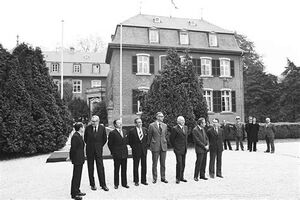Gymnich Meeting
 | |
| Location | Gymnich |
| Description | An informal set of meetings of the foreign ministers of the member states of the European Union |
| Planners | Hans-Dietrich Genscher, Willy Brandt |
A Gymnich meeting refers to an informal meeting of the foreign ministers of the member states of the European Union about every six months. Foreign ministers from certain countries associated with the EU usually also take part. At this meeting, foreign ministers come together for a weekend to discuss long-term strategies in a relaxed, informal setting.
In contrast to other working sessions, there is neither a clearly defined agenda, nor are the ministers accompanied by extensive staff, nor is there an official final document. In general, the results and events of the meeting are considered strictly confidential.
History
The term goes back to a meeting within the framework of European political cooperation in April 1974 in Gymnich Castle, belonging to the West-German government, which was organized by Hans-Dietrich Genscher. Since this meeting, they have taken place once per EU-presidency, i.e. once every six months. The conference venue is a hotel or country house in the country of the Presidency.
They allow a more open-ended discussion, in which problems can be discussed in more depth without immediate pressure to make decisions. Similar meetings of other members of the Council of the European Union have developed from the Gymnich meetings of the Foreign Ministers.
Gymnich Agreement
Already disagreeing on how to deal with the Yom Kippur War in October 1973 and the ongoing "oil crisis", Western European countries had tendencies to not want to subordinate their interests to the US.
As a consequence of such tensions, the US persuaded the government of Willy Brandt in West Germany to take the lead in the Gymnich formula, an agreement reached at the meeting of foreign ministers at Gymnich castle on 10 June 1974, the first Gymnich meeting. The United States was treated in the agreement as a special partner in consultations.
In 1974, under pressure from Washington, a consultation mechanism, close to U.S. views, between the US and the EPC was proposed by Günther van Well, Western German political director:
“If a member state government believes that an issue discussed within the EPC bears on important American interests, the US government should be informed. This should happen once consensus is reached on the matter, but before the decision is formulated in order to give the US government an opportunity to lay out its views, which the EC Nine could take into account during their final discussion round” [1]
“The Gymnich agreement,and its enshrinement in a non-paper practically ensured that EC states would no longer bear a joint influence on world events in any way that could antagonize the US.”[2], and was viewed as being against French political will as it ensured the presence of the United States in the process of European decision making.
The Gymnich Formula
The Gymnich formula was drafted at the Schloss Gymnich meeting. It was never written down, and announced only at the next foreign ministers’ meeting in June:
“If a member state government believes that an issue discussed within the EPC bears on important American interests, the US government should be informed. This should happen once consensus is reached on the matter, but before the decision is formulated in order to give the US government an opportunity to lay out its views, which the EC Nine could take into account during their final discussion round”
“The second point is the question of consultations. The Ministers were agreed that in elaborating common positions on foreign policy there arises the question of consultations with allied and friendly countries. Such consultations are a matter of course in any modern foreign policy. We decided on a pragmatic approach in each individual case, which means that the country holding the Presidency will be authorized by the other eight partners to hold consultations on behalf of the Nine.
In practice, therefore, if any member of the EPC [European Political Cooperation] arises in the framework of the EPC the question of informing and consulting an ally or friendly state, the Nine will discuss the matter, and upon reaching agreement, authorize the Presidency to proceed on that basis.
The Ministers trust that this gentlemen’s agreement will also lead to smooth and pragmatic consultations with the United States which will take into account the interests of both sides”[3]
Rating
References
- ↑ (Günther van Well 21 March 1974, https://webcache.googleusercontent.com/search?q=cache:ub8TA-CqyRoJ:https://hrcak.srce.hr/file/185581+&cd=4&hl=en&ct=clnk&gl=au
- ↑ http://webcache.googleusercontent.com/search?q=cache:eK7mntgX8F8J:www.sscnet.ucla.edu/polisci/faculty/trachtenberg/cv/ffus.pdf+&cd=4&hl=en&ct=clnk&gl=au
- ↑ hist.asu.ru/aes/EFP_Documents_0415158222.pdf